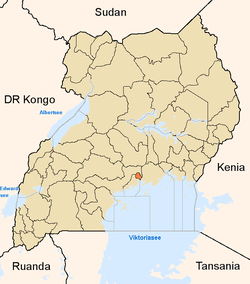Uganda Cancer Institute
| Uganda Cancer Institute | |
|---|---|
| Uganda Ministry of Health & Fred Hutchinson Cancer Research Center | |
| Geography | |
| Location | Mulago, Kampala, Central Region, Uganda |
| Organisation | |
| Care system | Public |
| Hospital type | Cancer Treatment, Research and Teaching |
| Services | |
| Beds | 80[1] |
| History | |
| Founded | 1967 |
| Links | |
| Website | Homepage |
| Other links | List of hospitals in Uganda |
Uganda Cancer Institute (UCI) is a public, specialized, tertiary care medical facility owned by the Uganda Ministry of Health. The facility is located along Upper Mulago Hill Road, on Mulago Hill, Central Division, Kampala, about 5 kilometres (3.1 mi) northeast of the central business district of the city.[2]
Overview
UCI is a cancer treatment, research, and teaching center, affiliated with the Makerere University School of Medicine and with the Mulago Hospital Complex, the teaching hospital for the medical school. UCI maintains an inpatient facility with a capacity of 80 beds.[1] It attends to an average of about 200 patients daily.[3]
In October 2011, ground was broken for a three-story, integrated cancer training and treatment facility, measuring nearly 60,000 square feet (5,600 m2). The new building, called the "Uganda Cancer Institute/Fred Hutchinson Cancer Research Center Clinic and Training Institute", is a project of the UCI/Hutchinson Center Cancer Alliance, a collaboration of UCI and the Fred Hutchinson Cancer Research Center in Seattle, Washington, USA. In May 2015, the completed facility opened and began attending to patients.[4][5]
History
UCI was founded in 1967 with twenty beds, as the Lymphoma Treatment Center, to treat childhood lymphomas, predominantly Burkitt's lymphoma, the most common childhood lymphoma in Uganda and endemic to tropical Africa.[6] In 1969, UCI expanded to a total of 40 beds, when the Solid Tumor Center was added to focus research on Kaposi's sarcoma and liver cancer.[7] "During the 1960s and early 1970s, UCI was a leading international medical research center, in its areas of specialization. UCI established collaboration with the National Cancer Institute (NCI) in Bethesda, Maryland."[8]
In 1972, following the expulsion of Ugandan Asians by dictator Idi Amin, nearly all of NCI's scientists left.[7] "Professor Charles Olweny, a Uganda researcher, interrupted his studies at NCI in the USA and returned to become the first Ugandan director of UCI. In 1982, following the overthrow of ... Amin, Olweny was forced to leave Uganda for security reasons, leaving leadership of UCI in the hands of Professor Edward Katongole-Mbidde. When Katongole-Mbidde left UCI to become the director at the Uganda Virus Research Institute in 1995, Dr. Jackson Orem took over the helm at UCI...."[8] Between 2011 and 2015, the bed capacity at the institute was increased to 80.[1]
International collaboration
The international research centers with collaborative projects with Uganda Cancer Institute include, but are not limited to the following:
- National Cancer Institute - Bethesda, Maryland, USA
- Fred Hutchinson Cancer Research Center - Seattle, Washington, USA
- Case Western Reserve University - Cleveland, Ohio, USA
Brachytherapy
In 2016, the institute installed a "Flexitron Cobalt-60 High Dose Rate" brachytherapy system from Elekta. The system is part of a two-year renovation plan that UCI is implementing at a cost of US$49 million.[9]
Teletherapy
In March 2016, the "Cobalt-60 Teletherapy" unit at UCI, which had been in use for the previous 20 years, broke down. Efforts to acquire a replacement unit are underway, with installation expected in 2018.[10][11] In the interim, the Uganda Ministry of Health has arranged with the Aga Khan University Hospital in Nairobi, Kenya, to offer teletherapy to some Ugandan patients.[12]
Medical directors of UCI
The following medical researchers have served as director of UCI since its founding in 1967:
- John Ziegler - American: 1967-1972
- Charles Olweny - Ugandan: 1972-1982
- Edward Katongole-Mbidde - Ugandan: 1982-1995
- Jackson Orem - Ugandan: 1995–Present
See also
References
- 1 2 3 Ainebyona, Emmanuel (22 May 2015). "Museveni launches state-of-the-art cancer institute". Daily Monitor. Kampala. Retrieved 22 May 2015.
- ↑ "Map Showing Mulago And Central Kampala With Route Marker". Globefeed.com. Retrieved 22 May 2015.
- ↑ Ainebyoona, Emmanuel (2 August 2016). "Cancer Institute receives six chemotherapy chairs worth 50m". Daily Monitor. Kampala. Retrieved 2 August 2016.
- ↑ Newsroom (19 May 2015). "Fred Hutch And Uganda Cancer Institute Open UCI-Fred Hutch Cancer Centre In Kampala". Newswise.com. Retrieved 20 May 2015.
- ↑ Daughton, Sandi (27 May 2015). "Hutch opens cancer research senter - 9,000 miles away". Seattle Times. Retrieved 28 May 2015.
- ↑ Varmus, Harold (17 March 2014). "Medical Research Centers In Mali And Uganda". Science And Diplomacy. 3 (1). Retrieved 22 May 2015.
- 1 2 Savage, Liz (24 July 2007). "Former African Cancer Research Powerhouse Makes Plans for a Return to Greatness". Journal of National Cancer Institute (JNCI). pp. 1144–1151. Retrieved 22 May 2015.
- 1 2 Kiwawulo, Chris (December 2012). "Cancer & HIV Fight Needs More Effort". New Vision Mobile (Kampala). Retrieved 28 May 2015.
- ↑ Vision Reporter (9 April 2016). "Mulago's new brachytherapy system improves cancer treatment". New Vision. Kampala. Retrieved 9 April 2016.
- ↑ Ainebyoona, Emmanuel (11 April 2016). "Cancer patients to wait for 2 years". Daily Monitor. Kampala. Retrieved 11 April 2016.
- ↑ Ainebyoona, Emmanuel (10 May 2016). "Government to build regional cancer centres". Daily Monitor. Kampala. Retrieved 10 May 2016.
- ↑ Ainebyoona, Emmanuel (8 July 2016). "Uganda's cancer patients set to go to Nairobi in shifts". The EastAfrican. Nairobi. Retrieved 8 July 2016.
External links
- Website of Mulago Hospital Complex
- Artist's Impression of the UCI/FHCRC Treatment Center and Clinic Under Construction At Mulago, Kampala Uganda
- New Cancer Unit Lights up Patients
- The New Cancer Facility Is A Beacon of Hope
Coordinates: 0°20′24″N 32°34′39″E / 0.3400°N 32.5775°E
